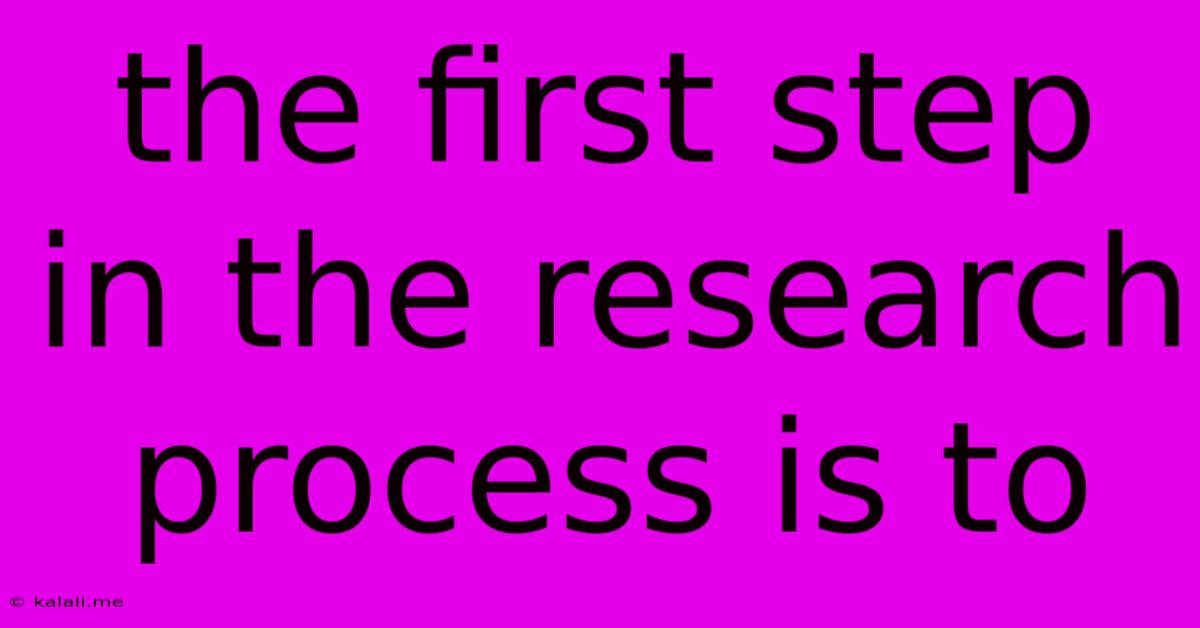The First Step In The Research Process Is To
Kalali
Jun 15, 2025 · 3 min read

Table of Contents
The First Step in the Research Process Is: Defining Your Research Question
The most crucial step in any research process, often overlooked, is clearly defining your research question. Before diving into literature reviews, data collection, or analysis, you need a solid, focused question to guide your entire journey. This initial step determines the direction, scope, and ultimately, the success of your research. Without a well-defined question, your research will lack direction, potentially leading to wasted time and inconclusive results.
This article will explore why defining your research question is paramount and provide practical steps to craft a compelling and effective one.
Why Defining Your Research Question Is So Important
A well-defined research question acts as a compass, steering your research efforts towards a specific goal. It provides:
- Focus: A clear question prevents you from getting lost in a sea of information. It helps you prioritize relevant data and ignore irrelevant details.
- Direction: It guides your literature review, methodology, and data analysis. Knowing what you're trying to find makes the entire process more efficient.
- Structure: It provides a framework for organizing your research and presenting your findings in a coherent manner.
- Measurable Outcomes: A well-defined question allows you to establish measurable objectives, enabling you to assess the success of your research.
- Credibility: A strong research question demonstrates a clear understanding of the subject and enhances the credibility of your research.
Crafting a Strong Research Question: A Step-by-Step Guide
Creating a compelling research question requires careful consideration. Here's a step-by-step guide:
-
Identify Your Broad Area of Interest: Begin by identifying the general topic you're passionate about. What subjects intrigue you? What problems do you want to solve?
-
Narrow Down Your Focus: Once you've identified a broad area, narrow it down to a more specific topic. This will help you avoid overwhelming yourself with too much information. Consider using keywords to refine your search.
-
Develop Preliminary Questions: Brainstorm several preliminary questions related to your narrowed topic. Don't censor yourself at this stage; let your ideas flow freely.
-
Refine Your Questions: Evaluate your preliminary questions and select the most promising ones. Consider factors like feasibility, relevance, and originality.
-
Formulate Your Research Question: Based on your refined questions, craft a concise and focused research question. Ensure it's clear, specific, and achievable within the constraints of your resources and timeframe. Your question should be testable or answerable through research.
-
Consider Different Question Types: Your research question might fall into different categories, such as:
- Descriptive Questions: These aim to describe a phenomenon or situation. Example: What are the common characteristics of successful entrepreneurs?
- Explanatory Questions: These aim to explain the relationship between variables. Example: How does social media influence consumer behavior?
- Evaluative Questions: These aim to assess the effectiveness or value of something. Example: What is the impact of a new teaching method on student performance?
Examples of Well-Defined Research Questions:
-
Poorly Defined: What about social media? (Too broad, lacks focus)
-
Well-Defined: How does the use of Instagram impact adolescent self-esteem? (Specific, measurable, and achievable)
-
Poorly Defined: Is climate change bad? (Subjective, not testable)
-
Well-Defined: What is the correlation between rising global temperatures and the frequency of extreme weather events in coastal regions? (Specific, measurable, and testable)
Defining your research question is the cornerstone of a successful research project. By following these steps and considering the different types of questions, you can create a compelling research question that guides your entire research process and leads to meaningful and impactful results. Remember, a well-defined question is the first step towards answering it effectively.
Latest Posts
Latest Posts
-
What Is The Antonym For Abundant
Jun 15, 2025
-
Which Of The Following Combinations Are Correctly Matched
Jun 15, 2025
-
In The Two Dimensional Body Illustrated The Gradient At Surface A
Jun 15, 2025
-
Movement Of A Limb Toward The Midline Of The Body
Jun 15, 2025
-
What Element Is Found In Proteins
Jun 15, 2025
Related Post
Thank you for visiting our website which covers about The First Step In The Research Process Is To . We hope the information provided has been useful to you. Feel free to contact us if you have any questions or need further assistance. See you next time and don't miss to bookmark.